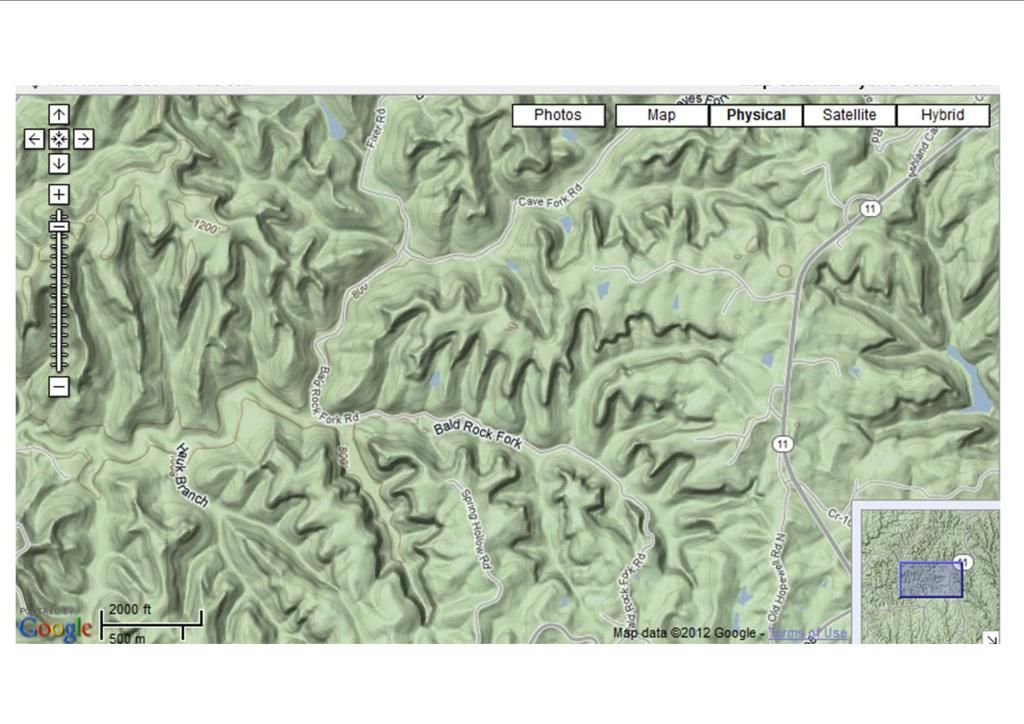Re: Digital bushwacking
Posted: Mon Jun 04, 2012 4:56 pm
Is it possible to get to the end of Buckner where the road dead ends at the top of the horseshoes?

No, I just used high-resolution orthography from KY geonet. I was surprised how well it worked. You just train it with a few sample pixels, then it goes off to classify every pixel in the data range. Seems to do well at picking out stark colors--would be ideal for finding ponds and fishing holes that you never knew were there, especially tiny ones that are easily overlooked.epitaph wrote:toad857, about the raster classification that you did to help distinguish forest from open habitat -- was the source data thermal?
I don't think so. I have used Arc quite a bit and have in fact used it for precisely what you are using it for now; however, there are free maps from government resources available online that have already mapped what you are trying to, and have done so very well. It is very fun stuff to play with though if you are a map geek.toad857 wrote:I think you're missing the point--.
I had some luck identifying areas using both ASTER and TM data. Running indices that can identify bare areas in Erdas and then exporting it to overlay on a DEM. Lets you know the areas that not only have high slope, but also exposed rock. The downside is that when you go slogging through the woods on a day that is either too cold, rainy, or hot to be climbing, you end up disappointed as 75% of the time these turn out to be 30' rounded bands of chossy rock that weren't worth all of the effort (unless you really enjoy the maps and bushwacks). It takes quite a bit of exposed rock to really show up with the spatial resolution of ASTER so it tends to identify low angle shit piles. It doesn't work in identifying much overhanging rock unless the top just happens to be void of vegetation.epitaph wrote: toad857, about the raster classification that you did to help distinguish forest from open habitat -- was the source data thermal? I've seen such data classically used in environmental applications (finding honeysuckle, for example). One would think that bringing in ASTER data (emissivity, thermal) could also help distinguish rock from forest canopy. During my research using LiDAR I started to see what I believed to be indices of honeysuckle growth on cleared slopes within the data as well, though it's purely speculation and I never pursued it systematically.
Thanks for sharing -- I figured someone had to have done this already. Pretty much what I would have expected in terms of the ASTER data (wildy varying resolution that tends to be a lot coarser than is claimed). On the whole topic of finding overhanging rock, that would appear to be somewhat out of the realm of conventional airborne remote sensing techniques. These maps aren't a method to automatically find climbing locations, they are visual aids to aid in the process of doing so. Just like climb2core found use in looking at the physical layer on Google to do so.Howie Feltersnatch wrote:I had some luck identifying areas using both ASTER and TM data. Running indices that can identify bare areas in Erdas and then exporting it to overlay on a DEM. Lets you know the areas that not only have high slope, but also exposed rock. The downside is that when you go slogging through the woods on a day that is either too cold, rainy, or hot to be climbing, you end up disappointed as 75% of the time these turn out to be 30' rounded bands of chossy rock that weren't worth all of the effort (unless you really enjoy the maps and bushwacks). It takes quite a bit of exposed rock to really show up with the spatial resolution of ASTER so it tends to identify low angle shit piles. It doesn't work in identifying much overhanging rock unless the top just happens to be void of vegetation.
Unfortunately no. The state of Kentucky is filled with overpaid, overweight, and under accomplished PVA offices. Most of them do not have any type of digital property map, much less any type of GIS. They keep track of ownership by using paper maps the same way they did around the turn of the century. They are so very far behind the national curve, that most don't even realize that this is a real possibility, much less the norm in other states. Much of the blame for this can be laid at the feet of coal and timber interest that essentially owned the PVA offices in most Kentucky counties in order to control their own tax rates. Even if you could scan and rubber sheet their maps, the property lines depicted are so notoriously incorrect that they would in many cases but utterly worthless and you would be no closer to knowing who owned what. Which leads to what pigsteak said and the fact that he is right; mostly this GIS stuff is just a game.Josephine wrote:Here's the $1,000,000 question: is there a way to take all the beautiful maps of potential cliff line and overlay it with boundary lines of current owners?